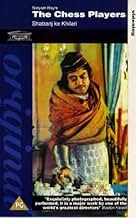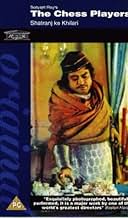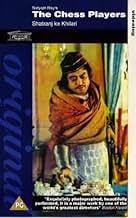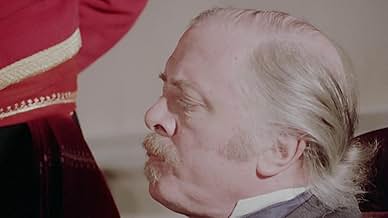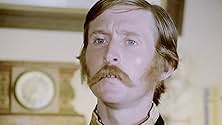ÉVALUATION IMDb
7,5/10
4,3 k
MA NOTE
Ajouter une intrigue dans votre langueIn 1856, two obsessed noblemen ignore everything while playing chess and fail to notice British rule extending into their Indian province.In 1856, two obsessed noblemen ignore everything while playing chess and fail to notice British rule extending into their Indian province.In 1856, two obsessed noblemen ignore everything while playing chess and fail to notice British rule extending into their Indian province.
- Prix
- 4 victoires et 3 nominations au total
Victor Banerjee
- Prime Minister
- (as Victor Bannerji)
Farooq Shaikh
- Aqueel
- (as Farooque Shaikh)
Bhudo Advani
- Abbajani
- (as Budho Advani)
Avis en vedette
Two aristocrats oblivious to what is going on around them play chess around the clock while the British plan a takeover of a northeastern Indian kingdom. These threads are interwoven seamlessly in Satyajit Ray's delightful comedy, The Chess Players, recently released on a Kino DVD. The film does not spare either side from the thrust of its gentle dagger, depicting both the apathy of the Indian upper classes and the arrogance of the colonial masters. Like many Satyajit Ray films, there are gorgeous dance sequences and appealing musical numbers, but unlike most, the spoken language is Urdu not Bengali, and it is a big budget film in Technicolor using name actors.
Based on a short story by Prem Chand, the film is set in Lucknow, India in 1856 and is narrated by the real Amitabh Bachchan. As the film opens, we learn that Oudh's King Wajid Ali Shah (Amjad Khan) has financed the British East India Company for ten years and also provided soldiers for its army. In exchange, the Company did not interfere with Wajid's rule, even though they viewed the king with disdain. This changed in 1856 when General Outram (Richard Attenborough) was instructed to depose the king and take over the kingdom to add to the British coffers. Outram, the local representative of the Company, justifies his ambitions for more territory by denouncing the king to an aide as an incompetent ruler and hedonist, ignoring his devotion to dance, poetry, and music.
In another thread, two Indian aristocrats Mirza (Sanjeev Kumar) and Meer (Saeed Jaffrey) play chess obsessively to the dismay of their wives, Khurshid (Shabana Azmi), and Nafisa (Fardia Jalal). Mirza's wife feeling neglected, steals and hides the chess pieces, while Meer's wife has an affair with his nephew (Farooq Shaikh). Unwilling to handle their domestic affairs, the two first use fruits and vegetables as their set pieces, then seek other places to play their game, refusing to believe that the British takeover is imminent. One of their stops is the home of their attorney who is on his deathbed. This doesn't stop the two from hilariously trying to sneak in a game of chess in another room.
The two players cling to their way of life, exchanging frivolous banter and smoking hookah pipes while the world around them crumbles. They finally take refuge in the home of a young boy, Kullu (Samarth Narain) who remained while others fled just to see the red-coated British soldiers march into the city. While perhaps not in the upper echelon of Ray's work, The Chess Players is a very entertaining political satire that provides wry insight into human nature and our capacity for denial. General Outram is portrayed as a well-meaning but totally condescending individual who utterly fails to understand the lives and culture of the people he seeks to control. Any resemblance to current U.S. Muddle-East policies, of course, is purely accidental.
Based on a short story by Prem Chand, the film is set in Lucknow, India in 1856 and is narrated by the real Amitabh Bachchan. As the film opens, we learn that Oudh's King Wajid Ali Shah (Amjad Khan) has financed the British East India Company for ten years and also provided soldiers for its army. In exchange, the Company did not interfere with Wajid's rule, even though they viewed the king with disdain. This changed in 1856 when General Outram (Richard Attenborough) was instructed to depose the king and take over the kingdom to add to the British coffers. Outram, the local representative of the Company, justifies his ambitions for more territory by denouncing the king to an aide as an incompetent ruler and hedonist, ignoring his devotion to dance, poetry, and music.
In another thread, two Indian aristocrats Mirza (Sanjeev Kumar) and Meer (Saeed Jaffrey) play chess obsessively to the dismay of their wives, Khurshid (Shabana Azmi), and Nafisa (Fardia Jalal). Mirza's wife feeling neglected, steals and hides the chess pieces, while Meer's wife has an affair with his nephew (Farooq Shaikh). Unwilling to handle their domestic affairs, the two first use fruits and vegetables as their set pieces, then seek other places to play their game, refusing to believe that the British takeover is imminent. One of their stops is the home of their attorney who is on his deathbed. This doesn't stop the two from hilariously trying to sneak in a game of chess in another room.
The two players cling to their way of life, exchanging frivolous banter and smoking hookah pipes while the world around them crumbles. They finally take refuge in the home of a young boy, Kullu (Samarth Narain) who remained while others fled just to see the red-coated British soldiers march into the city. While perhaps not in the upper echelon of Ray's work, The Chess Players is a very entertaining political satire that provides wry insight into human nature and our capacity for denial. General Outram is portrayed as a well-meaning but totally condescending individual who utterly fails to understand the lives and culture of the people he seeks to control. Any resemblance to current U.S. Muddle-East policies, of course, is purely accidental.
This movie is a precious gem. I have not seen anything like it and only a rare amount of movies dare to be as different. One cannot expect any less from Satyajit Ray, one of India's greatest filmmakers. Shatranj ke Khiladi is a satirical comedy that stars the best actors delivering the finest performances. Amjad Khan and Saeed Jaffrey definitely did their best for this movie. Sanjeev Kumar and Shabana Azmi are excellent as always. Richard Attenborough and Victor Banerjee do very well with their small roles. I was also surprised to see Farida Jalal in a negative comic role as an unfaithful wife. Ray also applies his artistic talents in set designs as you'll see some beautiful paintings. Background music is limited but used effectively. The movie was shot brilliantly where it is quite evident that the director has given attention to very little detail. There is one scene where Sanjeev Kumar goes to his room to see his wife. Saeed Jaffrey is waiting for him. We soon see a scene where Jaffrey goes to check on Sanjeev then when he returns...we see a hand changing the position on the chess board. This is just one of the finest example of excellent direction, among the many you'll witness in this classic masterpiece. The events of the 19th century are portrayed very poetically. While some may say that the pace is slow, it did not bore me one bit and there was always something happening. This, indeed, is a fine piece of film-making. I suggest you go and watch it.
Previous reviews have puzzlingly stated that this is one of the first films to break away from the commercial traditions of Bollywood. In fact, it belongs to a different tradition altogether - art cinema reflecting social themes - which has been going on since at least the early 1950s in India (where it was initially strongly influenced by Italian neo-realism) in the work of Ray, Mrinal Sen, and Ritwik Ghatak. All three were, perhaps significantly, Bengalis, and partook of the rich intellectual traditions of that region, most widely associated with the great poet and national figure Rabindranath Tagore.
The Chess Players is a delight from beginning to end. Taking its cue from the origins of chess as a war-strategy training game, Ray builds two narrative strands in parallel: in the mid-1850s, a pair of idle aristocrats become obsessed by chess and play it all day long, oblivious to the collapse of their domestic relationships that it causes; and in the larger world outside, the scheming and strategy of the chess-board is played out in the real-life scheming of the East India Company as it attempts to manoeuvre the Nawab of Oudh from his throne and bring the state within British jurisdiction. The two plotlines are beautifully brought together at the end when, after hearing that Company troops have moved in and the Nawab has abdicated, the chess-playing friends change their board layout to the Western manner, which involves the king and queen changing their starting positions: "Move over, king. Make way for [queen] Victoria!"
There are fine performances all round: from Amjad Khan as the Nawab, whose infinitely delicate sensibilities lead to infinite puzzlement at the connivings of the less fastidious, to Richard Attenborough as the Company representative in Oudh whose job it is to unseat him, who manages to convey a genuine belief that the state needs to be better run, with an underlying realization that he has no right to do what he is doing. Sanjeev Kumar and Saeed Jaffrey, as the chess players Mirza and Mir, both have extremely expressive faces that can switch from blustering bonhomie to pained hurt, or from deadpan seriousness to quizzical amusement, in a heartbeat. Jaffrey's talent for comedy will come as no surprise to viewers of his English-language films, and he provides the film's finest comic moment when he walks into his bedroom to find his wife trying to hide her lover (his nephew) under the bed - a moment straight out of a Feydeau farce.
Two moments of great artistic beauty stand out for me. First, when the Nawab, overwhelmed by the political situation while in conference with his ministers, seeks solace in a haunting, graceful song he had composed in a happier time (actually composed by Ray - perhaps the director showing us his self-identification with the character). Second, in a scene where Mir is left on his own at the chessboard while Mirza goes off to "see what the trouble is" with his wife, the camera follows Mir as he gets up and goes out into the hallway to see where his friend has got to. The camera then stays still as he retraces his steps, and in the vertical slice of light caused by a gap between two curtains that separate the hallway and the chess room, we see framed the precise point on the chessboard where Mir's hand slowly and surreptitiously comes into view as he sneakily moves one of the pieces. A virtuoso piece of camerawork and compositional framing that, like the film as a whole, never fails to enchant.
The Chess Players is a delight from beginning to end. Taking its cue from the origins of chess as a war-strategy training game, Ray builds two narrative strands in parallel: in the mid-1850s, a pair of idle aristocrats become obsessed by chess and play it all day long, oblivious to the collapse of their domestic relationships that it causes; and in the larger world outside, the scheming and strategy of the chess-board is played out in the real-life scheming of the East India Company as it attempts to manoeuvre the Nawab of Oudh from his throne and bring the state within British jurisdiction. The two plotlines are beautifully brought together at the end when, after hearing that Company troops have moved in and the Nawab has abdicated, the chess-playing friends change their board layout to the Western manner, which involves the king and queen changing their starting positions: "Move over, king. Make way for [queen] Victoria!"
There are fine performances all round: from Amjad Khan as the Nawab, whose infinitely delicate sensibilities lead to infinite puzzlement at the connivings of the less fastidious, to Richard Attenborough as the Company representative in Oudh whose job it is to unseat him, who manages to convey a genuine belief that the state needs to be better run, with an underlying realization that he has no right to do what he is doing. Sanjeev Kumar and Saeed Jaffrey, as the chess players Mirza and Mir, both have extremely expressive faces that can switch from blustering bonhomie to pained hurt, or from deadpan seriousness to quizzical amusement, in a heartbeat. Jaffrey's talent for comedy will come as no surprise to viewers of his English-language films, and he provides the film's finest comic moment when he walks into his bedroom to find his wife trying to hide her lover (his nephew) under the bed - a moment straight out of a Feydeau farce.
Two moments of great artistic beauty stand out for me. First, when the Nawab, overwhelmed by the political situation while in conference with his ministers, seeks solace in a haunting, graceful song he had composed in a happier time (actually composed by Ray - perhaps the director showing us his self-identification with the character). Second, in a scene where Mir is left on his own at the chessboard while Mirza goes off to "see what the trouble is" with his wife, the camera follows Mir as he gets up and goes out into the hallway to see where his friend has got to. The camera then stays still as he retraces his steps, and in the vertical slice of light caused by a gap between two curtains that separate the hallway and the chess room, we see framed the precise point on the chessboard where Mir's hand slowly and surreptitiously comes into view as he sneakily moves one of the pieces. A virtuoso piece of camerawork and compositional framing that, like the film as a whole, never fails to enchant.
The Chess Players is a curious film by the famed Indian director Satyajit Ray. Half in Hindi and half in English which is curious in itself. The story is about the take over of the Kingdom of Oudh, capital Lucknow, by the British. It shows the complete deceit of the British in their takeover of the Indian Sub Continent using underhand methods based in their emasculation of the Indian rulers. The Nawab of Oudh is a cultured Muslim ruler in the tradition of The Moghuls. The qualities admired by the culture of the time were not militaristic and patriarchal but cultural and aesthetic. The Nawab often sang songs to his people and danced for them or read poetry and wrote it of course. This was considered by the British to show signs of effeminacy and not good government. I fact the subjects of the Nawab who were for the most part Hindus, loved their Ruler for precisely these qualities and even though he was of a different faith, lived happily in a cultural paradise. The British represented by Richard Attenborough show a total lack of understanding of this culture and in a cynical move annex the kingdom and send the Nawab into exile.There was interestingly enough, no attempt at resistance but a bland acceptance of the will of God. Strangely sad and haunting film from one of India's greatest directors since Independence. Trivia. Lucknow was the city that Cliff Richard was born in and lived as a child before Independence.
This was my first Satyajit Ray movie. And I have to tell you that he truly deserved the lifetime Oscar that he got. The movie is a true classic. And Sanjeev Kumar proves again that what a class actor he is. Sayeed Jaffery and Amjad khan were also very good. The camera angles used in the movie were simply terrific. Especially that scene in which Sayeed Jaffery changes the pawns. This movie however I might say that is not for a regular movie viewer. As the story is slow and you get to know what a real art movie is. I hope Satyajit Ray would have made some more Hindi films for the Hindi viewers. I really loved it and would recommend it to anyone who loves art movies. A true gem of a movie.
Le saviez-vous
- AnecdotesSatyajit Ray's only Hindi movie.
- Citations
Mir Roshan Ali: Jinse apni biwi-yan nahin sambhli woh angreaz fauz se kya ladenge. Translation : Those whom couldn't even care for their wives, would not be able to fight the British army.
- ConnexionsFeatured in Celluloid Man (2012)
Meilleurs choix
Connectez-vous pour évaluer et surveiller les recommandations personnalisées
- How long is The Chess Players?Propulsé par Alexa
Détails
- Date de sortie
- Pays d’origine
- Langues
- Aussi connu sous le nom de
- The Chess Players
- Lieux de tournage
- Indrapuri Studios, Calcutta, Bengale occidental, Inde(studio: Indrapuri Studios, Calcutta)
- société de production
- Consultez plus de crédits d'entreprise sur IMDbPro
- Durée2 heures 9 minutes
- Mixage
Contribuer à cette page
Suggérer une modification ou ajouter du contenu manquant




